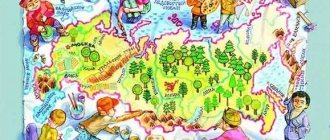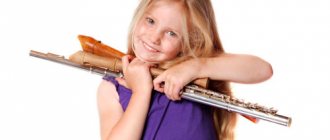Puzzles
If proverbs and sayings teach and instruct, then riddles develop ingenuity and intelligence in children. And riddles that involve numbers also help teach counting.
Any riddle is built on a metaphor. This is a means of artistic expression that involves describing any qualities of an object or phenomenon through other objects or phenomena. Remember the well-known riddles about the night and the stars, where the sky is a blue canvas, and the stars are small nails with which it is nailed. Indeed, if you look at the sky at night, the stars can be compared to the heads of nails.
Let's look at what comparisons riddles for children about numbers are based on. The most common number in folklore is seven. This is a sacred number, and the idea of harmony and the ideal is associated with it.
Thus, seven is compared to a scythe used to cut hay. Eight is very similar to a tumbler, because the number consists of two circles placed on top of each other. The two are often compared and drawn as a swan arching its neck. Zero is very similar to a donut or a ball, and six and nine always act like twins.
Children have a lot of their own ideas associated with numbers. You can ask the children not only to guess ready-made riddles, but also to compose their own.
This type of work develops:
- - logical thinking;
- - fantasy;
- - associative thinking,
which is very useful for the holistic creative development of the child.
Riddles with number 1
*** Two by two is four. Known in the whole world, Only _____ has no sister.
***
The three tiger cubs were not sad, they made a balloon. Two took off at dawn and suddenly disappeared from view. If these tiger cubs are taken away from us, what will remain with us?
***
I have two toys, tomorrow I will give one to Vanyushka. It's Vanya's birthday, I'll take him the horse. How many toys will I have at home tomorrow?..(One)
***
Like a leafless branch, I am straight, dry, thin. You often met me in the student's diary.
***
How many suns are there behind a cloud, How many refills are there in a fountain pen, How many noses does an elephant have, How many watches are there on his hand? How many legs does the fly agaric have, And how many attempts does the sapper have, He knows and is proud of himself..
Proverbs and sayings
These two words are often used together, although the roles of the two genres differ.
The purpose of a proverb is to teach, to instruct. That is why you will always find evaluative words in it, for example: “It’s easy to rake in the heat with someone else’s hands.” The proverb emphasizes that a person seeks to do something at the expense of another, and condemns such behavior. But the saying may sound almost the same, but does not give an assessment, but only states a fact: “Rake in the heat with someone else’s hands.” This is the main difference between a saying and a proverb.
For children, proverbs and sayings are often presented in pictures when it comes to teaching aids or children's books. This makes it easier for the children to understand the meaning of the statement. And picture books always looked more interesting.
Quite often the number seven appears in proverbs and sayings, for example: “Measure seven times, cut once.” This meant preparing well for the job and then doing it. Seven is a number denoting harmony, ideal. The number two is also often found in folklore: it is associated with family well-being and brotherly feelings: “Two boots are a match.”
Children often do not understand the hidden meaning of proverbs and sayings, so the task of adults is to explain this hidden meaning to them and make them understand that statements carry not only a direct, but also a figurative meaning.
Creative project “Numbers in riddles, proverbs, sayings”
Objective of the project:
Study proverbs and sayings, riddles in which numbers are found.
Project objectives:
Enrich children's speech with proverbs and sayings, develop attention, logic, and thinking.
Develop the ability to think and solve riddles
Proverbs
– short folk sayings with edifying content, folk aphorisms. The proverb has a second meaning, it is an allegory. For example, the proverb: The further into the forest, the more firewood - can be understood in the literal sense. And it can also be applied to study: the more you learn, the more new and interesting things open up.
The proverb is short, there are no unnecessary words in it. It is easy and quick to remember.
The proverb has a sister - the saying.
They look alike. Here's a saying: Are you trying to kill two birds with one stone? In fact, the person is not going to hunt hares at all, but is trying to simultaneously achieve two different goals.
Sayings –
short stable expressions that, unlike proverbs, do not constitute complete statements. Seven Fridays in a week - the saying is used as part of a judgment about those who deviate from their word and change their mind.
Proverb
- a complete sentence, and
a saying
is part of a sentence, part of a judgment, without a conclusion, without a conclusion.
Mystery
- a brief figurative definition of an object or phenomenon, but unlike a proverb, it gives this definition in a hidden, obscured form. As a rule, in a riddle, one object is described through another based on similar features: “The pear is hanging - you can’t eat it” (lamp). A riddle can also be a simple description of an object, for example: “Two ends, two rings, and a nail in the middle” (scissors). This is both a folk pastime and a test of ingenuity and intelligence.
Proverbs and sayings with numbers:
One foot is here, the other is there (to go very quickly, run somewhere, do something).
It’s better to see once than to hear a hundred times (You shouldn’t always trust words, it’s better to see something with your own eyes).
A coward dies a hundred times, but a hero dies once.
One head it's good, but two better.
If you lie once, they won’t believe you the next time.
Kill two birds with one stone (do two necessary, important things at once).
An old friend is better than two new ones (It is said when they want to emphasize the loyalty, devotion and irreplaceability of an old friend).
A horse has four legs, and even then it stumbles (Anyone can make a mistake, find themselves in a difficult situation. It is said to justify someone else’s mistake).
They've been waiting for the promised thing for three years.
The fifth wheel in the cart ( an extra person, unnecessary in any business).
Seven do not wait for one (
This is what they say when they start something without someone who is late, or with a reproach to someone who makes many (not necessarily seven) wait for themselves).
Seven nannies have a child without an eye ( The matter suffers if several people take on it. It is said about the actions of people or when, relying on each other, they did something wrong).
Don’t have a hundred rubles, but have a hundred friends (True friends always come to the rescue).
A true friend is better than a hundred servants.
Seventh water on jelly (Very distant relative).
Riddles with numbers:
Every person has two beautiful lakes, and between them there is a mountain. Name them, kids (eyes, nose).
Four brothers stand under one roof (table).
Antoshka stands on one leg; They are looking for him, but he does not respond (mushroom).
Two brothers went into the river to swim (buckets).
There is, friends, such a bird: if it lands on the page, I am very happy, and the whole family (five) is with me.
There is a completely different bird: if it sits on the page, then with its head bowed, I return home (two).
Two sisters run lap after lap one after another: the short one only once, the taller one every hour! (clock hands).
Every day at 7 am, I crack: it's time to get up! (alarm).
There are 33 heroes on the ABC book page. Every literate person knows the sages and heroes.
Two rings, two ends, in the middle - a nail (scissors).
“How many times do I have to tell you!” - the mother scolds the child, who cannot remember the score. But you can not scold the child, but sit him next to you and read proverbs that mention numbers. And believe me, the child will immediately stop being naughty, and at the same time she will repeat the counting and learn something new from proverbs.








